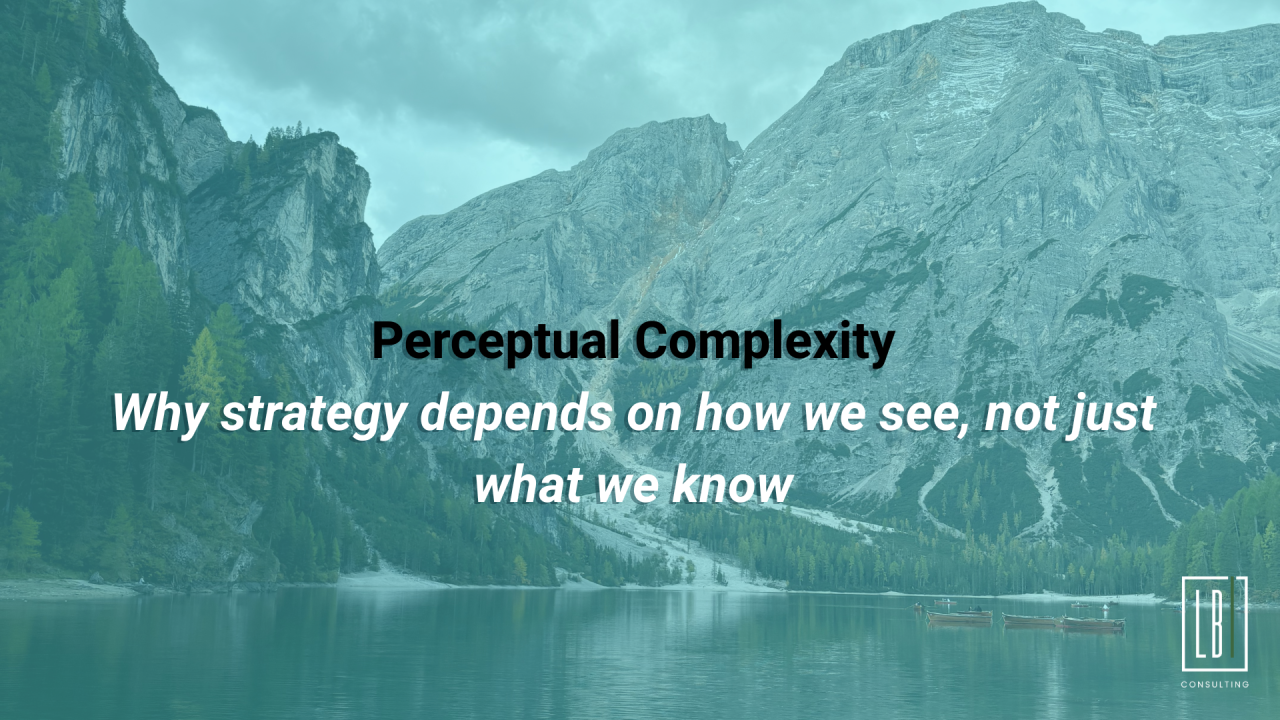
Insights on Strategy, Execution & Complex Organisations
I write about how strategy, execution and organisational design work in real-world environments — the kind that resist simple plans, reward systems thinking, and require leaders to adapt with clarity and purpose. Here you’ll find insights on strategic ambiguity, strategic manoeuvre, organisational viability, decision-making in complexity, and practical leadership thinking.
Browse the latest articles, or explore by topic below.
Start With Reality, Not Why
Many organisations start strategy with an inspiring purpose — and then wonder why execution fails. This piece explains how the gap between narrative and behaviour erodes coherence, damages trust, and weakens strategy at its core.
Execution is about adaptation, not control
Why execution fails when organisations stop adapting
We like to think that execution is the rational part of organisational activity. Strategy sets the direction, and execution is just doing what needs to be done. However, this idea only makes sense in a stable and predictable world.
Perceptual Complexity: Seeing Strategy from Different Mountains
Why strategy depends on how we see, not just what we know
I was walking around one of the lakes in the Dolomites when I noticed something quietly instructive. With every few steps along the path, the landscape shifted. The peaks that had seemed like one solid ridge unfolded into several layers. Valleys appeared where moments earlier there had been only shadow. What looked fixed from one vantage point changed shape entirely from another.
Organisation Shapes Strategy: Rethinking the Two-Way Relationship
On structural coupling, capability, and the real limits of choice
We often talk about strategy as if it comes first. Leaders design a strategy, and then “align” the organisation to deliver it. The familiar mantra is form follows function.
But the reality is more complex. Strategy and organisation are not linear. They are coupled.
When the loop closes: incestuous amplification, cognitive security, and the strategic collapse of sensemaking
In a world saturated by noise, narrative spin, and institutional echo chambers, the greatest threat to strategy is not what we don’t know. It’s how tightly we cling to what we think we do.
Most organisations will never notice the moment their strategy disconnects from reality. The numbers still look good. The meetings still run on time. The strategy still reads well on a slide. But somewhere, unnoticed, the feedback loop closes.
AI Won’t Save Your Strategy
Most strategy shortcuts look smart, but kill your ability to act when it matters.
Today, many are eager to outsource strategy to AI, attracted by its promise of fast answers and polished language. Yet this rush is framed as progress, even though it misses what truly matters.
But strategy isn’t an output. It isn’t a vision statement. It isn’t a PowerPoint deck.
The plan is nothing, planning is everything
The value isn't in the plan. It's in how you prepare to adapt.
There's a military adage that's made its way into business circles: "No plan survives first contact." Eisenhower sharpened it further: "The plan is nothing; planning is everything."
But most organisations still treat planning as if the goal is to lock everything down. Define every milestone. Predict every variable. Control every outcome.
And then they are surprised when it falls apart.
Aspiration After Observation: Why Strategy Starts with Seeing, Not Saying
Too often, purpose is treated as something you declare, design, and disseminate. It's written on the walls, embedded into decks, and broadcast at town halls. But when leaders treat purpose as real simply because it's been said, they mistake narrative for reality, and control for coherence.
Here’s the uncomfortable truth: It doesn’t matter what you say your organisation exists to do. It matters what your organisation actually does.
Mike's presentation delves into the complexities of the modern business landscape, sharing insights and approaches that can help leaders navigate challenges effectively.
In complex and high-stakes environments, stability is an illusion. Reflecting on my experiences as a soldier in Afghanistan, this talk explores the challenges of adapting strategy and execution in the face of chaos, risk aversion, and an agile adversary.
Podcasts and Talks.
Apperences from our founder Mike Jones.
Systems Thinking and Strategy for Leaders : Join us for an insightful interview with Mike Jones, founder and director of LBI Consulting, as we dive into the world of systems thinking and strategy.
In this reflective solo episode, Mike Jones steps back from the guest chair to explore a deeper truth: strategy is failing long before execution begins.
Mike sees strategy not as a top-down process, where the wishes of management become the gospel of the employees: strategy emerges from the actions of all. In this process, the Viable System Model is a valuable tool to develop a strategy and Mike explains how.








